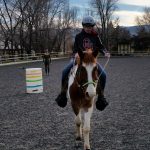 I don’t know if it is true or not, but it certainly seems to me that we are all experiencing more difficult and traumatic incidents in our lives. These are difficult times. In my own experience, my father died when I was very young.
I don’t know if it is true or not, but it certainly seems to me that we are all experiencing more difficult and traumatic incidents in our lives. These are difficult times. In my own experience, my father died when I was very young.  I have been robbed at gun point. I went through a period when I could not find a job, was unable to pay all my bills and worried about where I would live if I could not pay the rent. From addiction to homelessness. From violence in our schools and in our streets to out of control weather and even volcanic eruptions. The idea of a peaceful and trauma free life just does not seem possible. For children, teens
I have been robbed at gun point. I went through a period when I could not find a job, was unable to pay all my bills and worried about where I would live if I could not pay the rent. From addiction to homelessness. From violence in our schools and in our streets to out of control weather and even volcanic eruptions. The idea of a peaceful and trauma free life just does not seem possible. For children, teens  and adults, daily life has become more complicated, challenging and in many cases daunting.
and adults, daily life has become more complicated, challenging and in many cases daunting.
The Atlantic has a moving article about how children across our country are experiencing trauma. They are, and depending on how resilient they are and the help  they receive, the effects may impact the rest of their lives. The article talks about Adverse Childhood Experiences (ACEs) that can be trauma inducing. The “eight ACEs (parental divorce or separation; parental death; parental incarceration; violence among adults in the home; victim or witness to neighborhood violence; living with a mentally ill adult; living with someone who has a substance abuse problem; and experiencing economic hardship often,
they receive, the effects may impact the rest of their lives. The article talks about Adverse Childhood Experiences (ACEs) that can be trauma inducing. The “eight ACEs (parental divorce or separation; parental death; parental incarceration; violence among adults in the home; victim or witness to neighborhood violence; living with a mentally ill adult; living with someone who has a substance abuse problem; and experiencing economic hardship often,  such as the family finding it difficult to afford food and housing)” are key in determining which children 17 and under are more likely to experience trauma.
such as the family finding it difficult to afford food and housing)” are key in determining which children 17 and under are more likely to experience trauma.
Because there is strong evidence that, “When a parent has experienced a high number of ACEs, chances are their children will as well—often the same ones, such as depression or substance abuse,” we need to break the cycle. Pediatricians, social workers, or other professionals need to be trained and supported  in identifying when children are at risk and have the resources available to help. We need to offer help and solutions when we can and support and interventions when trauma has been experienced.
in identifying when children are at risk and have the resources available to help. We need to offer help and solutions when we can and support and interventions when trauma has been experienced.
We continue to talk about mental health care, but more must be done.
Through work with horses, Nevada Equine Assisted Therapy,  can be powerful option for those working to deal with and recover from trauma. Horses are accepting and non-judgemental. They help us become grounded and present in the moment. They can
can be powerful option for those working to deal with and recover from trauma. Horses are accepting and non-judgemental. They help us become grounded and present in the moment. They can  help those who feel scattered and easily distracted to find a place of focus. They help us establish/re-establish safe personal boundaries and build our confidence in our ability to solve problems and be good leaders.
help those who feel scattered and easily distracted to find a place of focus. They help us establish/re-establish safe personal boundaries and build our confidence in our ability to solve problems and be good leaders. 
We work with children as young as 4, teens, adults and even seniors. If you or someone you know are struggling, call or email and we will schedule a time for you to visit the ranch. We will show you around, introduce you to our herd, learn more about what you are dealing with and share how we may be able to help.
